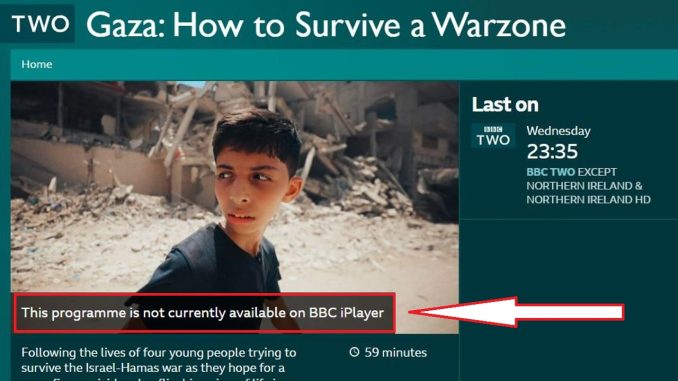
The BBC’s withdrawal of the powerful documentary, ‘Gaza: How to Survive a Warzone’, epitomises how much the UK’s national broadcaster is beholden to the Israel lobby.
The corporation’s longstanding systematic protection of Israel, considered an ‘apartheid regime’ by major human rights organisations, has been particularly glaring since the country launched its genocidal attacks on Gaza in October 2023. We have all seen the repetition and amplification of the Israeli narrative above the Palestinian perspective, omission of ‘Israel’ from headlines about its latest war crimes committed in Gaza, and even the dismissive treatment by senior BBC management of serious concerns about bias raised by their own journalists.
The documentary focused on the experiences of several children trying to survive in Gaza under brutal attack by Israeli forces armed to the hilt with weaponry and intelligence from the US, the UK and other western nations. It transpired that the film’s narrator, 13-year-old Abdullah al-Yazuri, is the son of Ayman al-Yazuri, a deputy minister of agriculture in Gaza’s government which is administered by Hamas.
Mr al-Yazuri previously worked for the United Arab Emirates’ education ministry and studied at British universities, obtaining a PhD in chemistry from the University of Huddersfield. Middle East Eye (MEE), an independently-funded online news organisation covering stories from the Middle East and North Africa, described him as ‘a technocrat with a scientific rather than political background’, pointing out that ministers, bureaucrats and civil servants in Gaza are appointed by Hamas.
Indeed, as MEE explained:
‘Many Palestinians in Gaza have family or other connections to Hamas, which runs the government. This means that anyone working in an official capacity must also work with Hamas.’
A campaign was launched by pro-Israel voices, including Tzipi Hotovely, Israel’s ambassador to the UK, and Danny Cohen, a former director of BBC television, to pressure the BBC to drop the documentary from iPlayer, soon after it was broadcast on BBC Two on 17 February.
Despite a countercampaign by over 1,000 media and film professionals objecting to the ‘racist’ and ‘dehumanising’ targeting of the documentary by supporters of Israel, the BBC quickly caved in, apologising for ‘mistakes’ that they deemed ‘significant and damaging’. Notably, however, the BBC did not point to any errors or inaccuracies in the actual editorial content of the programme.
Media Lens for more
